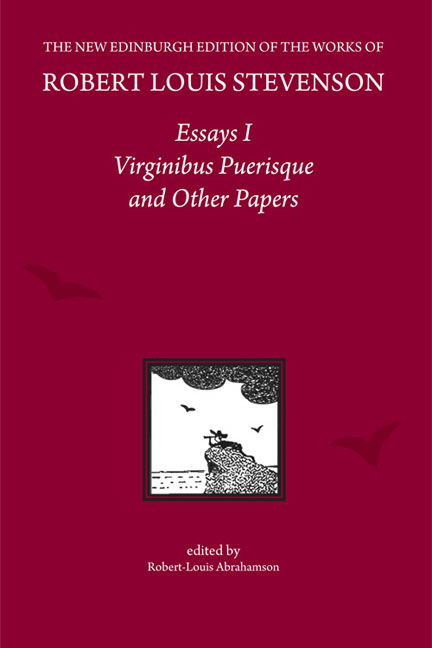Book contents
- Frontmatter
- Contents
- Acknowledgements
- Preface by the General Editors
- List of Abbreviations
- Chronology of Robert Louis Stevenson
- Stevenson’s Essays
- Stevenson as Essayist
- Introduction
- VIRGINIBUS PUERISQUE AND OTHER PAPERS
- Appendices
- Note on the Text
- Emendation List
- End-of-Line Hyphens
- Explanatory Notes
‘Virginibus Puerisque’
Published online by Cambridge University Press: 11 November 2020
- Frontmatter
- Contents
- Acknowledgements
- Preface by the General Editors
- List of Abbreviations
- Chronology of Robert Louis Stevenson
- Stevenson’s Essays
- Stevenson as Essayist
- Introduction
- VIRGINIBUS PUERISQUE AND OTHER PAPERS
- Appendices
- Note on the Text
- Emendation List
- End-of-Line Hyphens
- Explanatory Notes
Summary
WITH THE SINGLE exception of Falstaff, all Shakespeare's characters are what we call marrying men. Mercutio, as he was own cousin to Benedick and Biron, would have come to the same end in the long run. Even Iago had a wife, and, what is far stranger, he was jealous. People like Jacques and the Fool in Lear, although we can hardly imagine they would ever marry, kept single out of a cynical humour or for a broken heart, and not, as we do nowadays, from a spirit of incredulity and preference for the single state. For that matter, if you turn to George Sand's French version of As You Like It (and I think I can promise you will like it but little), you will find Jacques marries Celia just as Orlando marries Rosalind.
At least there seems to have been much less hesitation over marriage in Shakespeare's days; and what hesitation there was was of a laughing sort, and not much more serious, one way or the other, than that of Panurge. In modern comedies the heroes are mostly of Benedick's way of thinking, but twice as much in earnest, and not one quarter so confident. And I take this diffidence as a proof of how sincere their terror is. They know they are only human after all; they know what gins and pitfalls lie about their feet; and how the shadow of matrimony waits, resolute and awful, at the cross-roads. They would wish to keep their liberty; but if that may not be, why, God's will be done! ‘What, are you afraid of marriage?’ asks Cécile, in Maître Guérin. ‘Oh, mon Dieu, non!’ replies Arthur; ‘I should take chloroform.’ They look forward to marriage much in the same way as they prepare themselves for death: each seems inevitable; each is a great Perhaps, and a leap into the dark, for which, when a man is in the blue devils, he has specially to harden his heart. That splendid scoundrel, Maxime de Trailles, took the news of marriages much as an old man hears the deaths of his contemporaries. ‘C’est désespérant,’ he cried, throwing himself down in the armchair at Madame Schontz’s; ‘c’est désespérant, nous nous marions tous!’ Every marriage was like another grey hair on his head; and the jolly church bells seemed to taunt him with his fifty years and fair round belly.
- Type
- Chapter
- Information
- Essays IVirginibus Puerisque and Other Papers, pp. 5 - 34Publisher: Edinburgh University PressPrint publication year: 2018

